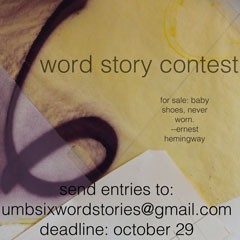“For sale; baby shoes, never worn” was purportedly written by Ernest Hemingway over a wager made in a diner. The supposed challenge: write a complete story using only six words. In the spirit of this, the University of Massachusetts Boston has created its own 6-Word Story Contest.
Open exclusively to undergraduates, who were each allowed three entries, the contest submission deadline ended Oct. 29. The stories are currently being evaluated by the judges, all of whom are Creative Writing MFA students.
Judge Lauren Von Hagel described the 6-Word Story Contest, which is in its second year of operation, as “a combined effort between the MFA program and undergraduate Creative Writing program to promote the writing opportunities available here at UMass Boston.”
Illuminating their criteria for a winning story, Von Hagel considers “For sale; baby shoes, never worn” to be a prime example of Hemingway’s “iceberg theory.” In his writing, Hemingway provides only sparse details, leaving the majority of the story to take place in the reader’s mind from the conclusions they draw.
Von Hagel said, “The best six-word (or any) stories embrace this idea and use the words on the page to indicate a wealth of characters and experiences … we’re looking for that sense of a full story underneath the chosen six words.”
According to judge Ryan Vautour, the contest received 213 entries, and the official judging session is set to occur on Nov. 13. The top 20 stories selected by the judges will be read on Nov. 20 at 3 p.m. in the Campus Center Ballroom, room 3550c. Prizes will come in the form of gift cards to the UMass Boston bookstore. The student who takes first place will receive $100, and the two runner-ups will receive $50.
In addition to gift cards, local recognition is another bonus of participating in the 6-Word Story Contest. Last year, the first contest garnered the attention of Boston.com, prompting an article written by a Globe correspondent.
However, freshman English major and avid writer John Morris says, “If you’re a true writer, you’re not thinking about the reward.” He considers the contest to be “an experience.” Penning these six-word stories has opened some students’ eyes to new possibilities of storytelling.
The contest is, for writers, “an exercise in expression and evocation,” according to Von Hagel. She said the six-word limit “forces you to strip away not only the obvious excess, but also things that, initially, might seem absolutely vital to the story you’re trying to tell.”
“It’s possible you can do so many things with six words,” says transfer student Krishna Sapkota.
According to ophomore Allister Quilon, exploring the six-word story form caused him to look closely at how people communicate.
“Trying to capture a moment that encompasses the gravity of the landmarks in our lives in just six words really pushed me to think about the effect of space in our daily conversations,” he said. “I think there’s a lot to be learned about people from the things that are not spoken out loud.”
Ultimately, Von Hagel hopes the contest will spark further interest in creative writing within the UMass Boston community.
“We want people to know about the classes they can take if they’re interested in creative writing — especially our sections of “English 210″ — and how many different forms that writing can take. A six-word story is a fun, challenging way to enter the worlds of poetry and prose,” she said.
Students like Morris found experimenting with the six-word story form helped him improve his writing.
“In a way, the stories that I submitted gave me some time to think about my style and where I want to be as a writer.” Referring to the contest as a whole, he added, “I’m glad to be a part of it … It inspired me to write, and I hope it inspires others to write as well.”
6-Word Story Contest brings out creativity and competition in students
October 25, 2013

The student who takes first place will receive $100, and the two runner-ups will receive $50.
